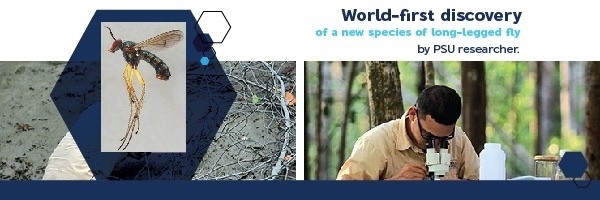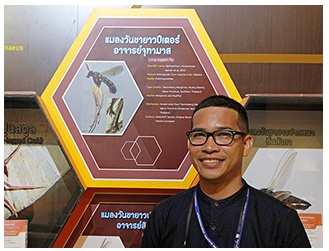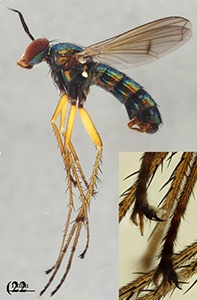
Prince of Songkla University researcher has discovered a new species of long-legged flies with a key role in the balance of the ecosystem. The creature is harmless to people or other animals.

Working at PSU’s Princess Maha Chakri Sirindhorn Natural History Museum, Dr. Abdullah Samoh, a researcher with expertise in the taxonomy of long-legged flies, flies, lice, and bats, revealed that the long-legged fly is a world-first new addition to the genus. It was first discovered in 2014 by the Tam Malang Mangrove Forest Research Unit, Muang District, Satun. The discovery was officially published in 2015, in collaboration with the National University of Singapore and a team from Belgium.

The new species, called Ngirhaphium chutamasae, can be found in mangrove forests close to the sea, in widely spaced inner mangrove canals during the lowest point of the low tide. Its common name, Peter “Professor Jutamas”, was chosen to honor research thesis advisor Assoc. Prof. Dr. Chutamas Satasook, Director of the Natural History Museum and Vice President of Academic Affairs at Prince of Songkla University.
The distinctive features of this long-legged fly are a golden green body of approximately 7 mm, thick and large tentacles, and the lower protrusions of the male reproductive part that look like boots.

Dr. Abdullah said that the species plays a predatory role in the mangrove ecosystem, eating the larvae of mosquitoes and saltwater gnat, thereby affecting the balance of the ecosystem but not doing any harm to humans or to other animals.
The species can be found only in the mangrove forests of Tam Malang, Satun, in their specific habitat. Any disturbance in the ecosystem could lead to the extinction of this species, because they are very sensitive to such changes. Therefore, related research can be used as analysis in solving problems about mangrove forests as well. No survey of this kind has been found in other areas of Thailand.

To learn more, you are most welcome to visit PSU’s Natural History Museum during the exhibition starting on February 2, 2021, open every Tuesday to Saturday (except public holidays). You can make reservations in advance on the website https://nhm.psu.ac.th/booking. Four rounds of tours are held per day, limited to 50 people per round as follows:
1st round: 9.00 - 10.30
2nd round: 10.30 - 12.00
3rd round: 13.00 - 14.30
4th round: 14:30 - 16:00
